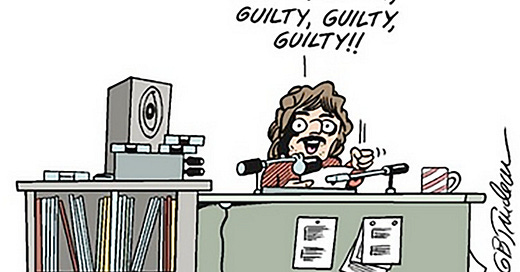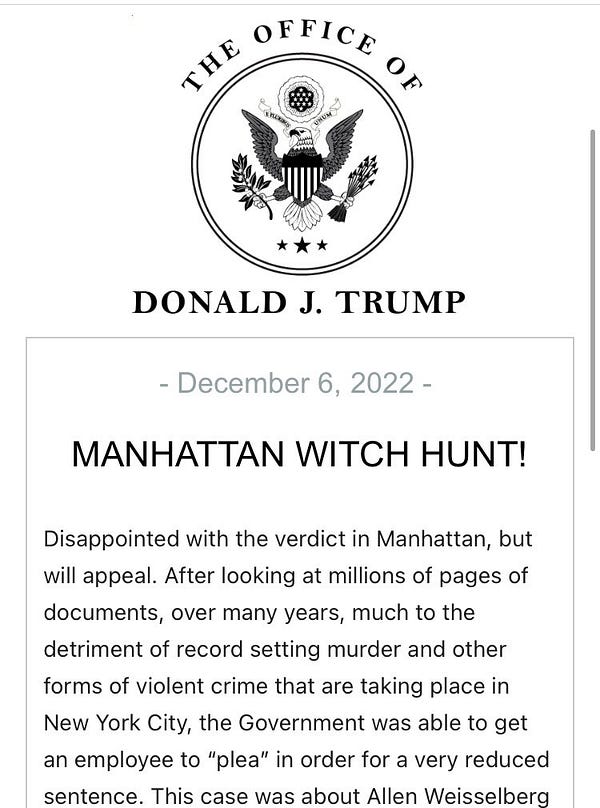Trump Organization Found Guilty On All 17 Counts In Tax Fraud Scheme
The penalty for scheming to defraud, conspiracy, criminal tax fraud, and falsifying business records: a bullshit $1.6 million fine, little more than a slap on the wrist.
The Trump Corporation
1 Scheme To Defraud In The First Degree — Guilty
2 Conspiracy In The Fourth Degree — Guilty
3 Criminal Tax Fraud In The Third Degree — Guilty
4 Criminal Tax Fraud In The Third Degree — Guilty
5 Criminal Tax Fraud In The Fourth Degree — Guilty
6 Falsifying Business Records In The First Degree — Guilty
7 Falsifying Business Records In The First Degree — Guilty
8 Falsifying Business Records In The First Degree — Guilty
9 Falsifying Business Records In The First Degree — Guilty
The Trump Payroll Corporation
1 Scheme To Defraud In The First Degree — Guilty
2 Conspiracy In The Fourth Degree — Guilty
3 Criminal Tax Fraud In The Third Degree — Guilty
4 Criminal Tax Fraud In The Third Degree — Guilty
5 Criminal Tax Fraud In The Fourth Degree — Guilty
6 Falsifying Business Records In The First Degree — Guilty
7 Falsifying Business Records In The First Degree — Guilty
8 Falsifying Business Records In The First Degree — Guilty
Donald J. Trump’s family real estate business was convicted on Tuesday of tax fraud and other financial crimes, a remarkable rebuke of the former president’s company and what prosecutors described as its “culture of fraud and deception.”
The conviction on all 17 counts, after more than a day of jury deliberations in State Supreme Court in Manhattan, resulted from a long-running scheme in which the Trump Organization doled out off-the-books luxury perks to some executives: They received fancy apartments, leased Mercedes-Benzes, even private school tuition for relatives, none of which they paid taxes on.
The Manhattan district attorney’s office, which led the case against two Trump Organization entities, had previously extracted a guilty plea from the architect of the scheme, Allen H. Weisselberg, the company’s long-serving chief financial officer. Mr. Weisselberg, one of the former president’s most loyal lieutenants, testified as the prosecution’s star witness, but never implicated Mr. Trump.
While prosecutors stopped short of indicting the former president, they invoked his name throughout the monthlong trial, telling jurors that he personally paid for some of the perks and even approved a crucial aspect of the scheme. The prosecution also sounded a drumbeat of damning evidence that spotlighted his company’s freewheeling culture, revealing that pervasive illegality unfolded under Mr. Trump’s nose for years.
The company’s conviction — coupled with the prosecution's explosive claim at trial that Mr. Trump was “explicitly sanctioning tax fraud” — could now reverberate through the 2024 presidential race, providing early fodder for opponents and their attack ads.
It also might lay the groundwork for the district attorney’s office to intensify its broader criminal investigation into Mr. Trump’s business practices . . . an inquiry that gained momentum in recent months . . .
The conviction on charges of tax fraud, a scheme to defraud, conspiracy and falsifying business records is hardly a death sentence for the Trump Organization. The maximum penalty it faces is $1.62 million, a rounding error for Mr. Trump, who typically notched hundreds of millions of dollars in revenue during his presidency.
Yet the verdict represents a highly public reckoning for the Trump Organization, forever branding it as a felonious enterprise. . . .
The former president has blamed it all on a politically motivated witch hunt. But while his attacks on prosecutors might appeal to his most loyal voters, lenders and the broader business world might now shun his company. . . .
Alan Futerfas, one of the company's lawyers, said the Trump Organization would appeal the verdict.
Prosecutors built the case largely around longtime Trump Organization Chief Financial Officer Allen Weisselberg, who pleaded guilty in August to 15 counts including tax fraud, conspiracy and grand larceny. He was promised a steeply reduced sentence of five months in jail in exchange for testifying against the company. He had faced up to 15 years in prison.
In his testimony, Weisselberg detailed how he and the company’s comptroller, Jeffrey McConney, schemed to cheat state and federal tax authorities over a 15-year period beginning in 2005. . . .
Prosecutors argued the conduct of Weisselberg and McConney made the company criminally liable. Two Trump Organization entities — the Trump Corporation and the Trump Payroll Corp. — were on trial. Both were found guilty on all charges. . . .
The Manhattan District Attorney's office also argued at the close of the case that Trump had personal knowledge of the tax cheating carried out by his executives. At one point in his summation, Assistant District Attorney Joshua Steinglass pointed to a document that had been initialed by Trump and called it “explicit” proof of his knowing that his executives were tinkering with expenses to reduce their tax liabilities.
Trump has not been charged with wrongdoing. In a recent social media post, he denied having knowledge of the crimes Weisselberg and McConney committed.
Donald Trump’s eponymous company was found guilty of tax fraud in a weeks-long Manhattan criminal fraud trial during which prosecutors claimed the ex-president was “explicitly sanctioning tax fraud.” The organization was convicted on all nine counts it faced, while the Trump Payroll Corporation was convicted on another eight counts. The jury deliberated for less than two days. . . .
Prosecutors alleged that the companies colluded in a 15-year-long tax fraud scheme. The alleged fraud plot centered on giving untaxed benefits to Allen Weisselberg, the Trump Organization’s former chief financial officer, in a “sweeping and audacious illegal payments scheme.” . . .
Weisselberg copped to a 15-count indictment in August . . . answer[ing] “yes, your honor” when . . . questioned if he “engaged in a scheme” with the Trump Organization “"to defraud federal, New York state, and New York City tax authorities.” Weisselberg’s bombshell admission appeared to directly place Trump’s businesses at the center of criminal wrongdoing, including tax fraud and falsification of business records. . . .
Weisselberg served as prosecutors’ star witness at trial. He linked Trump’s companies to illegal tax practices. Weisselberg told jurors that the rent on his free apartment “was authorized by Donald Trump.” He said that the Trump Corporation paid his utility fees and said it “was my understanding” that this practice was green-lighted by Trump.
During his second day testifying, Weisselberg said that he and other company honchos tried to remove sketchy financial activities from several Trump companies’ records when the reality TV big became president. . . .
Trump was not pleased with the verdict on Tuesday, releasing a lengthy statement calling the verdict the “continuation of the Greatest Political Witch Hunt in the History of our Country,” adding that “New York City is a hard place to be ‘Trump,’ as businesses and people flee our once Great City!”






